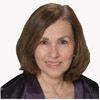From the Corner Office: Carol Khoury, NYSSA

This month’s Corner Office spotlight shines on Carol Khoury, managing director of membership & marketing, for the 10,000-member New York Society of Security Analysts (NYSSA).
|
Association Adviser: Carol, tell us a little bit about NYSSA.
Carol Khoury: NYSSA was founded in 1937 by 20 influential analysts, including Benjamin Graham, generally regarded as the “father of securities analysis.” We’re a leading forum for the investment community and our mission is to promote best practices and the highest professional and ethical standards in the industry.
With nearly 10,000 members, NYSSA is the largest of the 135 societies worldwide that make up CFA Institute, which has more than 105,000 members.
AA: What are the most significant changes you’ve seen in the association world over the past three years?
CK: I think most associations are finally coming to grips with the fact that they can no longer “do business as usual” and hope to survive. It’s a “new world order” out there, and they have to adapt. The associations that don’t adapt are simply dinosaurs and not long for this world. The new world order has to do with shifting demographics (baby boomers approaching retirement and Gen X and the Millennials rising); different modes of communications (virtual and social media); and an elemental change in what people value.
AA: Carol, your members work extremely long hours in a high-pressure industry. How do you motivate them to find the time and energy for NYSSA activities?
CK:: We have tried to make it easier for members to attend events by lowering the barriers to entry. Our monthly networking event at a local pub, for instance, does not require pre-registration and we don’t charge a fee. Members buy their own drinks and the “regulars” know it’s on the last Thursday of every month at the same location.
AA: What big changes, if any, do you see on the horizon?
CK:: There will probably be a shakedown. Associations that refuse to embrace change will see their membership contract or, at worst, disappear. More specifically, I think we’ll see more customized types of memberships that satisfy individuals’ interests and needs. And when we meet members’ needs, they will engage more deeply with the association. But it will be a challenge to implement. Associations will have to research what members really want and value, and then figure out how to deliver it – without reinventing the wheel a thousand times.
AA: In general, are associations getting better at keeping up with the times?
CK: The ones that have become better at keeping up with the times will survive. Those who have not probably won’t make it.
AA: Has NYSSA changed its membership recruitment and retention strategy in response to the many changes affecting Wall Street?
CK: We constantly try to understand what our members want and need. We want to make sure our value proposition reflects this. Then we work on developing member benefits that solve the problems they’re facing.
AA: Any examples you can share with us?
CK: Sure. For example, we found out that many members who are sole practitioners or who are in transition need affordable health insurance coverage. We partnered with a large insurance company to offer group rates to members. This appeals to current members and is a good selling point for those who are considering joining.
Another example: Our members are always asking for new networking opportunities. We have educational events and social events like wine tastings, harbor cruises, etc. Then we started a monthly informal gathering at a local pub. No reservations are required and there’s no cost other than BYOB. It’s a no-brainer. For busy, overbooked Wall Street types like our members, it’s ideal. They like the fact that they can just show up after a busy day at work and make connections in a relaxed atmosphere. We’ve gotten nothing but positive feedback from attendees.
AA: All in all things seem to be trending in a positive direction. What’s keeping you up at night?
CK: At 3 a.m., I try to envision what NYSSA will look like in five or 10 years. Will everything be delivered “virtually,” or will our members still value the one-on-one, personal interactions they enjoy today?
AA: Are there any other key takeaways you’d like to share with our readers?
CK: Simply stated, reinvent your association or face extinction!

